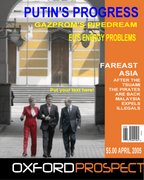If you're interested in books, famous authors, celebrities and fine dining, the Sunday Times Oxford Literary Festival, in the first week of April, is the place to be.
Book fans, at the festival, were able to walk with the literati gods and soak up the Oxford dream. If you were lucky, you might perhaps, speak with your favourite author.
Certainly, the festival's choice of writers was eclectic, from local science writer Richard Dawkins, London poet Ben Okri, former politician and television presenter Oona King, Sunday Times columnist Cristiana Odone, derivatives expert Nassim Nicholas Taleb, playwright Tom Stoppard and novelist Fay Weldon.
As for the writers' performances during the week, many were very professional and gave slick sales presentations of their latest books. Today, writers are like medieval itinerant traders travelling from town to town with their wares. This means most have become well practiced in their jokes and speeches, though for some they don't even bother to change the script, even for the next presentation they are in that very same town. In effect, visitors to the literary festivals are paying to see a series of book commercials.
Professor Richard Dawkins
Dawkins was at the festival to promote his latest book ‘The Oxford Book of Modern Science Writing’. This excellent new book is a collection of writings by different scientists, chosen by Dawkins, that captures the joys of scientific understanding since 1900 to the present day, for the public at large.
What was memorable about Dawkins’ presentation, was that he arranged to have former BBC Radio Oxford presenter David Freeman interview Richard Dawkins about his work, opinions and his latest book, with Dawkins wife reading out appropriate, but often amusing passages to the great enjoyment of the audience present.
Amongst the questions Dawkins’ was asked was, what he thought of his critics. Dawkins answered that he regarded them as insignificant ‘fleas’.
One of the writers included in his book as an extract, is best selling Cambridge University scientist Steven Hawking’s work ‘A Brief History of Time', though Dawkins admitted with a laugh: ‘I must be the one of the extremely few people who managed to finish reading the book to the very end.'
Amongst other writers Dawkins admires is Peter Atkins, Dawkins has included an excerpt in his anthology from Atkins book ‘The Creation Revisited’ Dawkins observes: ‘Peter writes in a wonderful poetic style, worthy of Carl Sagan.'
London poet Ben Okri
One of the sublime moments at the festival were London poet Ben Okri reading extracts from his latest book of poetry ‘ Starbook'. His verse made one believe one was in a world of fairy tales, not the hard realities of the modern world. When Ben finished the audience broke into long sustained cheers.
The Black Swan Phenomenon
Attending a presentation given by Nassim Nicholas Taleb proved to be a disappointment. Taleb had problems right from the start, in his production about his book ‘The Black Swan: The Impact of the Highly Improbable'. Instead of providing a thought provoking account of the usage of the Black Swan logic phenomenon, the audience was subjected to a rather repetitive and confusing ramble through the topic, which at times gave the impression that a black swan was some sort of black parrot rather than an Australian variety of Swan.
He argued that the Black Swan phenomenon is an event or occurrence that deviates beyond what is normally accepted as a situation, and that would be extremely difficult to predict, for example the fall of the Berlin Wall. The author contended that this phenomenon is used by speculators as a basis for their computer models to predict prices in futures markets.
Taleb managed to sow such bewilderment in my mind, that subsequently forced me to consult my notes, from my university days about the use of the Black Swan phenomenon to clear up the resultant confusion Taleb had caused in his talk.
As for side events there were discussions on current affairs, some of which were sit down formal dinners with the writers speaking on topics that are commonly fashionable with the literati. The trouble was, their dialogue often revealed, how generally ignorant the speakers were outside their particular expertise.
The Business of the Festival
Behind the scenes the real business of the festival was taking place, with deals during festival week were being struck as writers, agents, publishers and Public Relations reps were busy networking at a string of parties held in Oxford's many colleges or over lunch in the cities restaurants. For many of the publishers, the Oxford Literary Festival is really a book trade event for publishers like Blackwells and Oxford University Press to promote their books.
Certainly, to the visitor, the festival was organised in a very professional, yet unobtrusive manner. The festival has grown, over the past twelve years from just a few rooms in Oxford's Union building in the heart of the old city to taking over Christ Church, Oxford's largest college with its many available rooms and many other locations throughout Oxford’s town centre.
Where were the popular European writers?
What struck me about the Sunday Times Literary Festival was that this was really an English book fair, not a European literary festival. It's as if our neighbours in mainland Europe with their wealth of talented writers did not exist. Where were the popular European writers who publish their books in English, like Danish science writer Bjorn Lomborg, Swedish crime fiction author Hakan Nesser, and Italian novelist Umberto Eco?
Now that the Oxford Literary Festival has ended for another year, it is time to remedy this situation and bring a taste of European talent to visitors to the next literary festival to Oxford in 2009.
The Festival ran from Monday 31st March– Sunday 6 April 2008
Further information
About the Festival www.sundaytimes-oxfordliteraryfestival.co.uk

